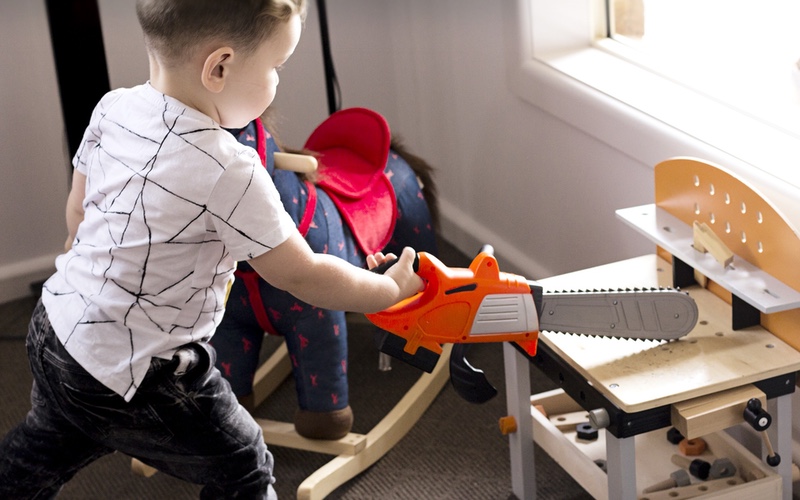Romp n' Roll Blog

How to Connect With Your Kids Through Imaginative Play
Mar 31st, 2021
Child Development, Fun & Activities, Tips
A child’s imagination is endless and their world of play holds many benefits. From bolstering confidence, exercising problem-solving skills, and improving concentration to developing language, imaginative play is an essential part of early childhood development. If you let your child play alone, you are missing out on important learning and bonding opportunities. There’s no need to feel shy about imaginary play, you too were once a kid! If you’re not sure how to make the most out of playtime, follow our below tips.
Stay Engaged
It means the world to your child when you set aside time to play with them. Don’t let distractions ruin this important bonding experience. During playtime, turn off your cellphone or other devices to minimize interruptions. Be sure to show your interest by acting excited, afraid, happy, and sad in all the right places. Help your child navigate his or her imaginary world with enthusiasm.

Your Child is the Leader
The most important part of imaginary play is to ensure your child takes control. This is their world, so let them show you around. You are their sidekick, so be sure to do whatever your child asks. If your child wants to play School, have him or her be the teacher and you the attentive pupil. Doctor? You are the sickly patient, safely in the hands of your well-educated daughter or son.

Say "Yes!"
Imaginative play is all about, well, imagination! That means anything goes (as long as no one gets hurt). If your child suggests that the sky is red, don’t discourage them with a “no, that doesn’t make sense.” Imagination encourages creativity which allows children to explore concepts in different ways. While riding around on pretend horses may seem foolish, your child is actually learning. Play is where children learn about themselves, others, and the world around them.

Present Problems
While it’s best to let your child take the lead, injecting problem scenarios into the game encourages problem-solving skills. If you two are playing Fisherman, tell your child you see a large wave coming that might tip your boat over! The next step, of course, is to ask your child for the solution. Don’t get discouraged at unrealistic solutions -- this is imagination, remember? Presenting problems allows your child to think outside of the box and come up with his or her own unique solutions.

Use Props
Props add dimension to imaginative play. If you’ve got a fully-stocked play kitchen, that’s great, but don’t underestimate the value of everyday items. Your couch may serve as a train, a shoe as a telephone, stuffed animals as sickly patients.

Connect to Real Life
Often children get stuck on one topic and their play will revolve around this same theme for days or weeks. This is a great opportunity to invest in your child’s interests! If your son loves playing Firefighter, purchase a few firefighter-themed books as nightly reading and take him for a tour of the local station.

Connecting with your child through play is an important part of parenting. Not only does it encourage the healthy development of your child’s growing mind, but it is also the perfect opportunity to get to know your little one better. If you are intimidated by one on one play, consider first enrolling in mommy and me classes where you can learn creative play in a more structured setting. You can then take these lessons home and incorporate playtime into your schedule!